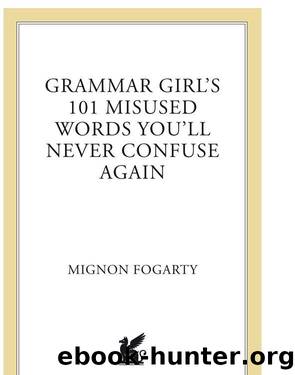Grammar Girl's 101 Misused Words You'll Never Confuse Again (Quick & Dirty Tips) by Fogarty Mignon

Author:Fogarty, Mignon [Fogarty, Mignon]
Language: eng
Format: epub
Publisher: St. Martin's Press
Published: 2011-07-04T21:00:00+00:00
I Versus Me
The simple little pronouns I and me often give people fits when they’re combined with other
pronouns or names in a sentence.
I is a subject pronoun, so you use it when you are the subject of a sentence—the one taking action.
That fight … it was the first honest interaction you and I have had since we came back to work.
—Lisa Edelstein playing Dr. Lisa Cuddy in the TV show House
Me is an object pronoun, so you use it when you are the object of a sentence—the one receiving an
action—or when the pronoun follows a preposition such as between, of, or over.
Only a person who wanted to find the Stone—find it, but not use it—would be able to get it. That is one of my
more brilliant ideas. And between you and me, that is saying something.
—Richard Harris playing Albus Dumbledore in the movie Harry Potter and the Sorcerer’s Stone
QUICK AND DIRTY TIP
Consider which pronoun you would use if it were the only one in the clause. That’s still the one you want even if there are other people
in the sentence, and it’s usually easier to see the right choice that way.
Impact
Although impact has taken root in the business world as a verb, as in Cutting prices will impact our
revenue, many people maintain that impact is proper only as a noun, meaning “effect.”
At a time when the public is rightly concerned about the impact of sex and violence on TV, this
administration is gonna protect the MUPPETS!
—Richard Schiff playing Toby Ziegler in the TV show The West Wing
Objectors believe that the verb impact means only “to hit,” and any other use is just irritating jargon.
Usually when you are tempted to use impact as a verb, affect is the better choice.
You don’t let other people’s problems affect you. You don’t let your own problems affect you. And it’s the
problems that make us interesting.
—Jesse Spencer playing Dr. Robert Chase on the TV show House
QUICK AND DIRTY TIP
If you can put an article such as an or the in front of impact, you are using it in the most proper way—as a noun.
Imply Versus Infer
Implying is something done by writers or speakers. Inferring is something done by listeners or
readers.
When you imply, you hint at something rather than saying it directly. Imply comes from an Old French
word that meant “to enfold.” You can think of an implied statement as hidden, or folded, into what
was actually said.
I’ve got a great cigar collection—it’s actually not a collection, because that would imply I wasn’t going to
smoke every last one of ‘em.
—Ron White, comedian
When you infer, you deduce some meaning that was left unsaid. Infer comes from a Latin word that
means “to bring in.” You can think of readers or listeners using their own interpretation to bring into a
sentence a meaning that isn’t explicitly stated.
We infer the spirit of the nation in great measure from the language.
—Ralph Waldo Emerson
The incorrect use of infer to mean imply is so common that in a decade or so it may be considered
standard, but for now, careful writers and speakers continue to make a distinction.
Download
This site does not store any files on its server. We only index and link to content provided by other sites. Please contact the content providers to delete copyright contents if any and email us, we'll remove relevant links or contents immediately.
| Slang & Idioms | Vocabulary |
| Word Lists |
Cecilia; Or, Memoirs of an Heiress — Volume 1 by Fanny Burney(31333)
Cecilia; Or, Memoirs of an Heiress — Volume 3 by Fanny Burney(30934)
Cecilia; Or, Memoirs of an Heiress — Volume 2 by Fanny Burney(30889)
The Lost Art of Listening by Michael P. Nichols(6474)
We Need to Talk by Celeste Headlee(4871)
Asking the Right Questions: A Guide to Critical Thinking by M. Neil Browne & Stuart M. Keeley(4576)
On Writing A Memoir of the Craft by Stephen King(4214)
Dialogue by Robert McKee(3583)
I Have Something to Say: Mastering the Art of Public Speaking in an Age of Disconnection by John Bowe(3517)
Pre-Suasion: A Revolutionary Way to Influence and Persuade by Robert Cialdini(3414)
Elements of Style 2017 by Richard De A'Morelli(2945)
The Book of Human Emotions by Tiffany Watt Smith(2772)
Good Humor, Bad Taste: A Sociology of the Joke by Kuipers Giselinde(2557)
Name Book, The: Over 10,000 Names--Their Meanings, Origins, and Spiritual Significance by Astoria Dorothy(2492)
Fluent Forever: How to Learn Any Language Fast and Never Forget It by Gabriel Wyner(2446)
The Grammaring Guide to English Grammar with Exercises by Péter Simon(2394)
Why I Write by George Orwell(2360)
The Art Of Deception by Kevin Mitnick(2299)
Don't Sleep, There Are Snakes by Daniel L. Everett(2217)
